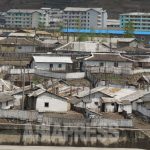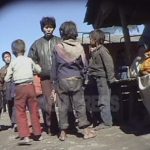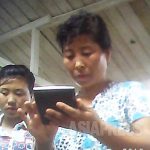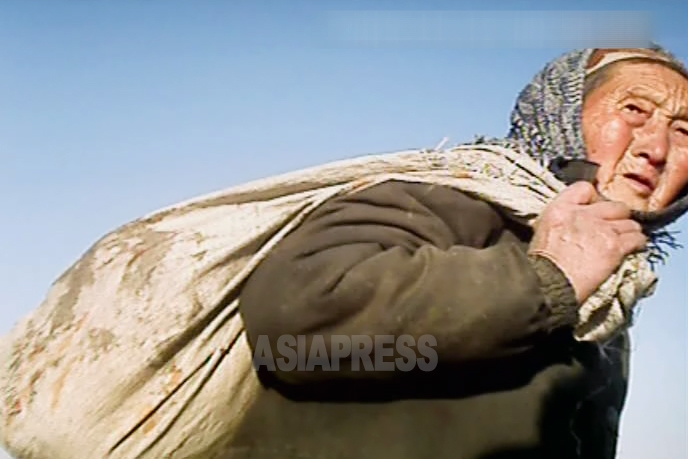
◆ Poverty-stricken urban dwellers head to farms, which offer conditions that are little better
After the authorities in North Hamgyung Province began recruiting people living in urban areas to migrate to farm villages with promises that the state would provide them with food and housing, there has been a flood of people suffering from poverty interested in the offer. North Korea’s collective farms continue to suffer from a chronic shortage of labor, and the rise in urbanites suffering poverty due to the economic troubles of the past several years seemed to offer a solution for the labor shortage. However, there are already problems emerging in how well farming communities can accommodate the influx of volunteers. (KANG Ji-won / ISHIMARU Jiro)
In Hoeryong, North Hamgyung Province, the authorities made attractive promises to people as they began efforts to recruit them for migration into farming communities. These promises included guaranteed housing, three months’ worth of food, and land people can farm on freely with any cost to themselves. In regards to the recruitment efforts, an ASIAPRESS reporting partner gave the following report earlier this month:
“The efforts to recruit urbanites for migration to farms began with a Workers’ Party order. The recruitment efforts are focusing on the younger generation. Recruiters are focusing on people under difficult circumstances working at state-run factories and enterprises and are offering them three months’ worth of corn, a place to live, and 120 pyeong (around 4,269 square meters of land) of farmland free of charge. There’s a lot of people applying for the opportunity from among those suffering from poverty. (Recruiters) say that people will be placed the farming community of their choice.”
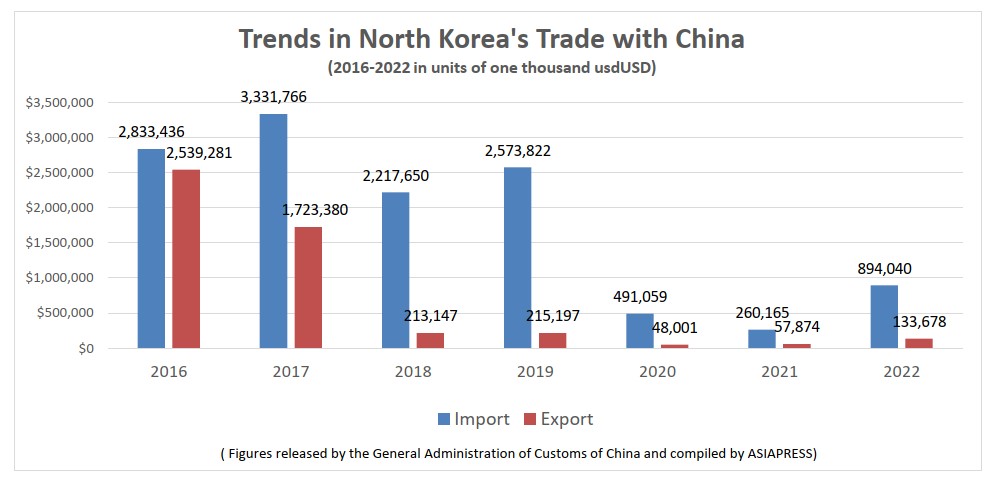
◆ The shocking decline in the quality of life for urbanites
Most of North Korea’s state-run enterprises have slowed or stopped operations, and have long failed to provide even wages or food distributions to their employees. The male breadwinners of families have been forced to head to work with almost no pay, meaning that many wives have been pushed to earn money for their families at local markets. There have also been many cases where men pay their workplaces to turn a blind eye to them taking on jobs elsewhere, such as working on construction sites or transporting people or things around.
However, North Korea’s economic situation changed with the start of the COVID-19 pandemic in January 2020. Trade with China came to almost a complete halt, and North Korea’s government restricted movement and private economic activities under the pretext of preventing the spread of the disease. A major depression in economic activities began in the cities, and people’s cash income fell dramatically.
The poverty that hit urbanites who had lost their cash incomes was shocking. In the fall of 2020, mass crowds of people appeared in farming communities throughout the country every day to pick up grains from the ground. There were even people who wandered around farming communities saying that they would do some work in exchange for food. There have also been people who have died of starvation and illness among the country’s vulnerable classes of elderly and the sickly. A reporting partner in Hoeryong gave this account:
“Even within downtown Hoeryong, there’s a lot of people who can’t earn anything no matter what they do. People say that the only way to survive this year is to farm. The country will soon experience the barley hump, and people just can’t see a way forward. There are people starving to death. The government’s offer of three months of food means that you won’t face starvation in the immediate term, and that’s why everyone who is suffering is trying to go to the farms.”
※ Barley hump: a period of food shortages around the spring when people have eaten all that was harvested in the previous fall.
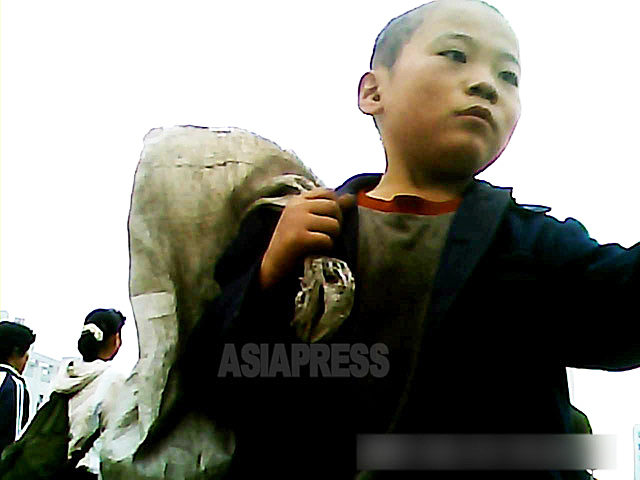
◆ The situation at collective farms that have begun accepting urbanites
In February, collective farms began accepting poverty-stricken people from the cities. Recently, an ASIAPRESS reporting partner visited a mid-sized farm in a part of North Hamgyung Province to investigate the situation there. The reporting partner found that the authorities had ordered farm managers to take good care of people volunteering for service at the farms as part of efforts to increase the number of volunteers.
That being said, the reporting partner made clear that the process of the farms accepting people from the city has not been smooth sailing.
“People from the city who arrived at the farm looked just like homeless people. They hadn’t even brought blankets, and all they had brought with them was a couple of burlap bags.”
Moreover, the “good treatment” promised to the volunteers came to terms with the realities of the farms. An important issue was food.
“There was a promise to provide three months’ worth of corn (to the volunteers), but the farm had such a lack of grains to provide them that farm managers ordered farmers to provide each household (of volunteers) with five kilograms of corn, beans and grains.”
The bigger issue, however, was housing. The authorities had promised volunteers would be given housing, but the reporting partner said that the farm in question did not have any housing prepared for the volunteers. Volunteers were either placed in public-use facilities on the farm or were given rooms in the houses of farms.
“They told the volunteers to just endure things for now because they’ll get houses in the spring, but it is only natural that the farmers hate being shacked up with the volunteers, who are little more than homeless people. The farm managers are trying to persuade the farmers to accept the situation by offering them food and firewood in exchange for lending space for the volunteers to live.”
◆ The reason why urban dwellers are heading to farms
Farmers are the poorest class in North Korean society and are even called nongpo, a term that, while it can also refer to farmland, also means “blister.” People born in farming communities have little hope of making a break from life on the farm given it is almost impossible for them to migrate to cities. Moving from the city to the farm or vice versa is considered a “change in social class,” meaning that farmers at the lowest rungs of the social ladder have no hope of becoming urban dwellers (This reality was starkly seen during the DPRK’s major famine of the late 1990s)
In fact, that urbanites are going to farms in droves does not mean that life on the farms has improved. Farmers are still forced to live difficult lives. Urban dwellers, however, are finding that living on the farms is better than wandering the streets in hunger given the fact they have no other way to earn a living.
As of February 14, ASIAPRESS was unable to confirm whether the government policy of moving people from cities to the farms in North Hamgyung Province is a nation-wide policy or not.
※ ASIAPRESS communicates with its reporting partners through Chinese cell phones smuggled into North Korea.
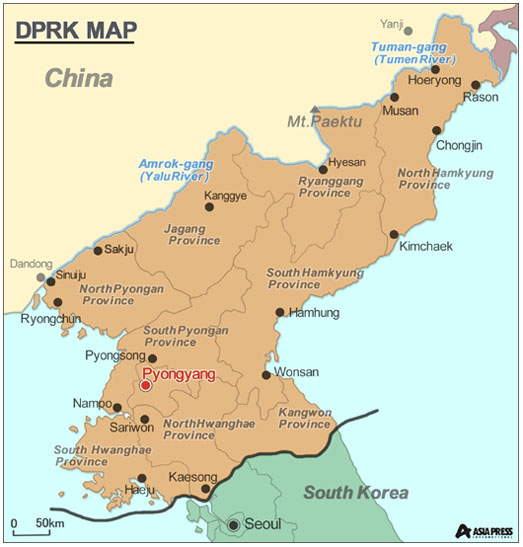
- <Emergency Interview> What did you think when you saw Kim Jong-un’s daughter at the military parade? “Nobody thinks that she will become successor”
- <Inside N. Korea>Harsh cold snap in January leads to death toll, with frozen bodies found in fields or inside mud huts…Authorities order closer monitoring of the people in response to rise in wandering people
- <Inside N. Korea>Even high-level cadres mobilized to collect human feces during this year’s “manure battle”…People bring buckets with them when going to the public lavatory
- <Confidential Document>Runaways, suicides and deaths are commonplace in N. Korea’s police detention facilities, leading Kim Jong-un to sign off on measures to punish those in charge
- Facing an extreme cold snap, North Koreans are in the middle of a terrible war with the cold ISHIMARU Jiro
